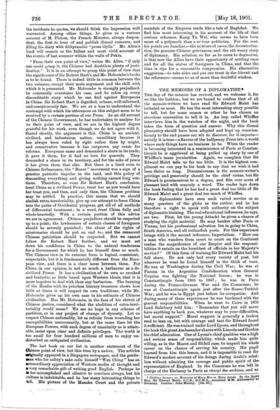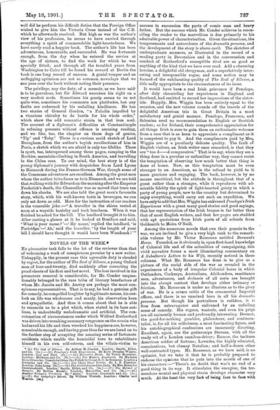THE MEMOIRS OF A DIPLOMATIST.*
THE day of the memoir has revived, and we welcome it, for we like the fashion ; but we are bound to confess that of all the memoir-writers we have read Sir Edward Malet has irritated us most. He has the most interesting story possible to tell, but for some reason or other he has chosen an atrocious convention to tell it in. An imp called Whiffles interviews him in the watches of the night, and the book takes the form of question and answer. Why this dismal pleasantry should have been adopted and kept up conscien- tiously to the end passes our wit to discover, for it imports— naively it is true—a flavour of the halfpenny Press into a world where such things have no business to be. When the reader is becoming interested in a reminiscence of Paris or Constan- tinople he is aggrieved at being pulled up sharp by one of Whiffles's inane jocularities. Again, we complain that Sir Edward Malet tells us far too little. It is the highest com- pliment we can pay to his book to say that we wish it had been thrice as long. Discursiveness is the memoir-writer's privilege and generosity should be the chief virtue, but Sir Edward is parsimonious to a degree, and flits over acres of pleasant land with scarcely a word. The reader lays down the book feeling that he has had a great deal too little of Sir Edward Malet and a great deal too much of Whiffles.
Few diplomatists have seen such varied service in so many quarters of the globe as the author, and he has therefore a right to speak with authority on the subject of diplomatic training. The real educational influences, he says, are two. First, let the young Attaché be given a chance of studying the right material. He may banker after Paris or Vienna, but his professional salvation lies in going to China, South America, and all outlandish posts. For this experience brings with it the second influence, Imperialism. "How can a man who wanders from court to court on the Continent realise the magnificence of our Empire and the responsi- bilities it entails on the humblest of officials in her Majesty's service ?" Of this form of training Sir Edward Malet had his full share. He not only had every variety of post, but wherever he went he found himself in the thick of wars. He was at Washington during the Civil War; he was at Parana in the Argentine Confederation when General Urquiza was fighting the National forces ; he was in Constantinople from 1865 to 1867; he was in Paris during the Franco-German War and the Commune ; he was at Constantinople again just after the Russo-Turkish War; and he was in Egypt just before its occupation. And during many of these experiences he was burdened with the gravest responsibilities. When he went to Cairo in 1879 Lord Salisbury told him : "Remember that you will never have anything to back you, whatever may be your difficulties, but moral support." Moral support is generally a broken reed to lean on, but with courage and tact Sir Edward found it sufficient. He was trained under Lord Lyons, and throughout the book this great Ambassador shares with Lincoln and Gordon his chief admiration. One of Lyons's chief qualities was a high and serious sense of responsibility, which made him quite willing, as in the Mason and Slidell case, to imperil his whole career on the chance of serving his country. His pupil learned from him this lesson, and it is impossible to read Sir Edward's modest account of his doings during Arabi's rebel- lion without admiring the courage and public spirit of the representative of England. In the Commune he was left in charge of the Embassy in Paris as charge des archives, and so
• Shifting Scene,; or, Memories of Many Men in Many Lands. By the Eight Hon. Sir Edward Malet, 0.0.B., G.C.M.G., sometime HL imbassador to Germany. London : John Murray. [10e. 6d.]
well did he perform his difficult duties that the Foreign Office wished to give him the Victoria Cross instead of the C.B. which he afterwards received. But high as was the author's view of his profession, he seems to have carried through everything a spirit of commendable light-heartedness. We have rarely read a happier book. The author's life has been adventurous, honourable, and successful. He was fortunate enough, from the day when he entered the service at the age of sixteen, to find the work for which he was specially fitted; and through all the troubled years from Washington to Cairo till he found his reward at Berlin the book is one long record of success. A genial temper and an unflagging optimism are not so common nowadays that we can pass over the book without noting their presence.
The privilege, nay the duty, of a memoir, as we have said, is to be garrulous, but Sir Edward exercises his right on a very modest scale. Sometimes his gossip seems to us not quite wise, sometimes his comments are platitudes, but any faults are redeemed by his unfailing kindliness. He has two stories of General Gordon, "a Paladin impelled by a vicarious chivalry to do battle for his whole order," which show the odd romantic strain in that iron soul. The account of a diplomat's difficulties at Constantinople in refusing presents without offence is amusing reading, and we like, too, the chapter on those dogs of genius, ' Tip ' and 'Toby.' There is a curious acrid sketch of Lord Brougham, from the author's boyish recollections of him in Paris, a sketch which we are afraid is only too lifelike. There is sport, too, interspersed among these pages, camping in the Rockies, mountain-climbing in South America, and travelling in the China seas. To our mind, the best story is of the young diplomat's journey with despatches from Lord Lyons to Bismarck during the Franco-German War, though some of the Commune adventures are excellent. Among the great men whom the author introduces us to is Bismarck, and we are told that,walking with Sir Edward on the morning after the Emperor Frederick's death, the Chancellor was so moved that tears ran down his cheeks. We are also told the great man's favourite story, which, with his well-known taste in beverages, we can only set down as odd. Here for the instruction of our readers is the venerable joke :—" A traveller in the shires rested at noon at a wayside hostelry and took luncheon. When it was finished he asked for the bill. The landlord brought it to him. After casting a glance at it he looked at Boniface and said,
'What is your name ? My name,' replied the landlord, is Partridge.'—' Ah,' said the traveller, by the length of your bill I should have thought it would have been Woodcock! "







































 Previous page
Previous page